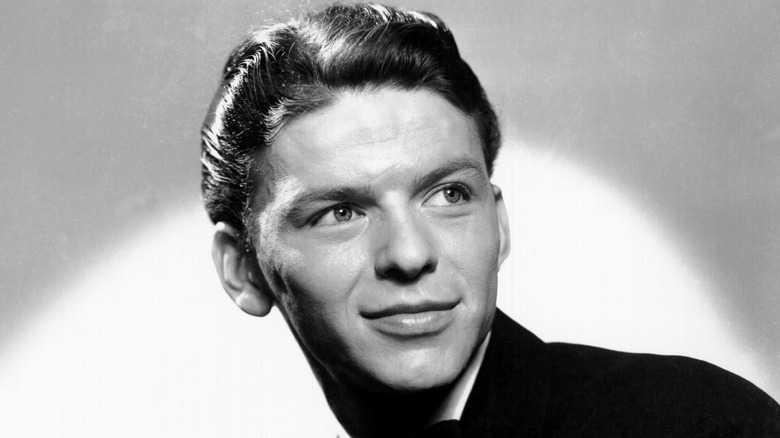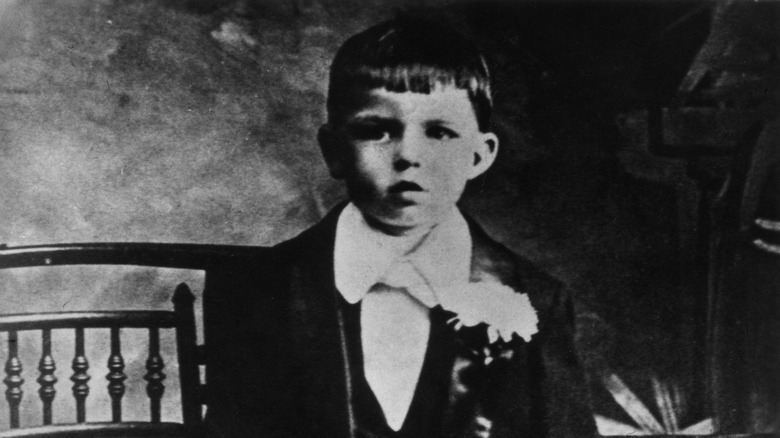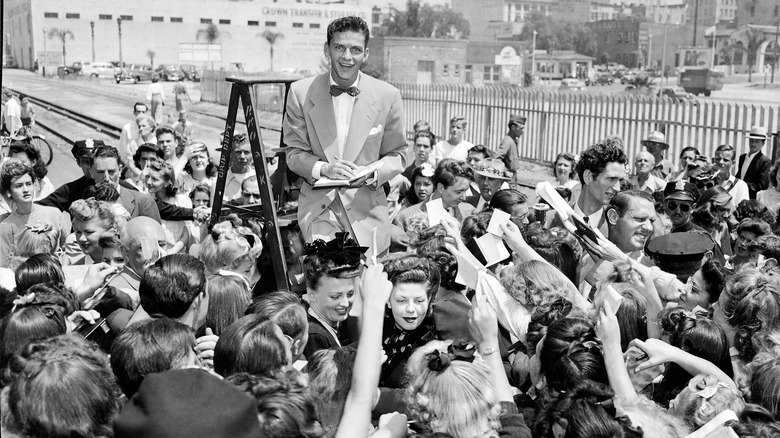The Most Tragic Detail About Frank Sinatra Everyone Forgets
Frank Sinatra remains one of the defining voices of the 20th century, whose style of crooning represents a period during the 1940s and 1950s when the biggest stars in America were known for their silken voices, magnetic stage presence, and effortless charm. As a stalwart performer during the big band era, Sinatra's music dominated the Billboard charts for years, with hits like "My Way," "New York, New York" and "Love and Marriage" now considered timeless classics. He also became a celebrated Hollywood actor, starring in blockbuster movies like "From Here to Eternity" and "On the Town."
On stage and screen, Sinatra personified ease and effortlessness. But the truth is that his early life was anything but easy. Indeed, Sinatra barely survived his birth at all. Born unusually large, the child was injured as the doctor fought to release him with forceps (an injury to his eardrum he sustained reportedly kept the singer out of World War II, during which time he was a rising star). At birth, Frank Sinatra was assumed stillborn by the doctor who delivered him. But Sinatra's grandmother, Rosa, who was a midwife just like Sinatra's mother, saved the infant who was not breathing by running him under a cold water tap, after which he awoke and began to cry.
For his fans, Sinatra's troubled birth showed that he was by nature a fighter, who was destined to rise to the top. The tragic nature of Sinatra's birth into the world had repercussions for Sinatra and arguably shaped his life and personality in ways his family could never have foreseen.
A tough upbringing
The future legendary Frank Sinatra was born Francis Albert Sinatra on December 12, 1915, in Hoboken, New Jersey. His life began in a cold water tenement apartment on Monroe Street. His father, Martin, was a migrant from Sicily, while his mother, Dolly, came from Genoa. In his youth, Martin worked as a cobbler to help support his parents, but later worked as a laborer, a barman, and a firefighter, supplementing his income as a talented prizefighter while Dolly became a midwife and was involved in local politics.
At the time of Sinatra's birth, money was tight. According to Spencer Leigh's "Frank Sinatra: An Extraordinary Life," after Frank was born his mother Dolly told his father: "That's my Christmas present to you. We can't afford anything else." The difficulties of Sinatra's birth, which may have been fatal for Dolly had the doctor not intervened, meant that his mother was unable to have more children, contributing to Sinatra's loneliness during his childhood. Sinatra's parents were often away working throughout childhood and when he wasn't being cared for by his grandmother, Rosa, the only child spent much of his time alone exploring the local neighborhood and trying to make friends. In his early life, Sinatra still bore facial scars and marks on his neck from his difficult birth. These earned him the nickname "Scarface" among the local children, and he would often experience bullying and violence. He would also face beatings at the hands of his mother. Unsurprisingly, Sinatra developed a fierce temper from an early age and became notorious for his displays of anger at school.
A 'god-given' gift
Frank Sinatra's improbable survival was viewed as something of a miracle by his family and the wider Italian Hoboken community to whom they belonged. Indeed, the family had strong Catholic beliefs, particularly Dolly. As biographer Earl Wilson claims in "Sinatra: An Unauthorized Biography," Sinatra was told as a child that he had been saved by God during his difficult birth and that he was destined for great things. Wilson quotes a "famous analyst" who describes Sinatra's early years in these terms: "Every day as he looks at himself in the mirror and sees the scars, he is motivated to sing and be heard and prove that God was right in saving him." Along with the toughness he developed throughout his early life, it is perhaps this aspect of Sinatra's complex personality that gave him the determination to reach the top.
Sinatra's good looks had developed in his late teens, and those who know him today as a show business veteran may be unaware that during his breakout years in the early 1940s, he was perhaps the number one heartthrob in the country, with millions of teenage girl fans, known as the "bobby soxers," obsessing over the singer with his famously striking blue eyes. Nevertheless, Sinatra remained somewhat insecure about his scars, preferring to be photographed from the right so that they were less visible to the camera.


